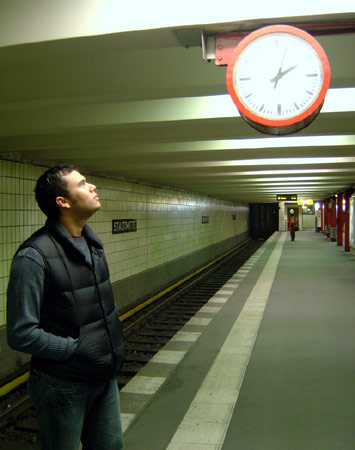Culture and Society: Time Orientation
Perception of Time
With Germany's historical association with clocks and timepieces, it should come as no surprise that punctuality is considered one of the higher virtues. Firmly linear in their orientation, the Germans see time as a sequence of events leading inexorably toward greater efficiency and progress.
Most Germans are at least nominally Catholic or Protestant and so have a cultural concept of an afterlife. However, a substantial portion of the population is atheist or agnostic, and either deny or question any existence beyond the earthly one.
Traditional Calendar
Germans use the solar-based Gregorian calendar, introduced by Pope Gregory XIII in 1582 to better accommodate the timing of Roman Catholic holidays. This calendar centers around the nativity of Jesus Christ, using a system in which each successive year before and after this event is numbered in ascending order. The years prior to the nativity are followed by B.C. (Before Christ), and those after the nativity by A.D. (for Anno Domini, meaning "In the year of our Lord"). This wording is sometimes altered to BCE (Before Current Era) and CE (Current Era) in the modern age to incorporate people of other religious persuasions. Both continuums begin with the number one; there is no year zero.
The German calendar records both Protestant and Catholic holidays, as well as national holidays. In addition to holidays set on specific days, many German holidays follow the Bewegliche Feste (Moveable Feast) pattern of celebrations held on dates that are not fixed. For example, Schmutziger Donnerstag (Dirty Thursday) varies, depending on when Karneval (Carnival) takes place.
Attitude Toward Time
The German attitude toward time is summed up in the well-known saying, Pünktlichkeit ist die Höflichkeit der Könige,(Punctuality is the courtesy of kings). Germans have an international reputation for precision and punctuality. This is no stereotype, but a very real description of German culture and expectations. Paying close attention to time is critical when doing business in Germany, where punctuality indicates honesty, respect, and proper planning.
Germans are staunchly monochronic, attending to each task at a dedicated time. Schedules are specific plans to be followed step-by-step rather than general guidelines. Events such as meetings are normally well-organized and follow a pre-planned agenda.
In this clock-oriented society, last-minute decisions are rare, especially in government and business. Proposals need to be thoroughly examined and discussed, and all angles need to be identified and explored before a conclusion can be reached. Germans expect people to make appointments to have their needs considered, rather than posing questions outside of work hours or at an inconvenient time.
Because Germans work single-mindedly during work hours, vacations and personal time are considered sacrosanct. For Germans, work time and free time are mutually exclusive.
Social Engagements
When invited over for dinner, Germans arrive on time, but never early. If circumstances require them to be more than a few minutes late, they will telephone the host and offer an explanation. For meal invitations in restaurants, personal meetings with friends, parties, and other social functions, the protocol in Germany is to arrive at the stated time in order to avoid inconveniencing others.
Business Engagements
Since Germans take punctuality seriously, they tend to arrive on time for all appointments. If they are unavoidably delayed, they will call immediately and offer an explanation and apology. Germans also avoid canceling a meeting on short notice, as this is considered rude and could damage their business relationship. When meeting an individual or a group in a business setting, a German will arrive exactly on time and expect any foreign counterparts to be punctual as well. The same applies to meetings with government officials or functionaries.
As mentioned earlier, German meetings of all kinds follow agendas strictly, so meetings usually end at the planned time. Because traffic is heavy throughout the day in many German cities, frequently resulting in delays, Germans tend to plan extra time into their schedule if heading to a meeting by car or taxi. German public transportation, though, is usually very reliable, rarely being more than one or two minutes behind schedule.
Although they value their time off, Germans take production and service deadlines seriously and will meet deadline dates even if it means putting in extra work or hours to do so.
Article written for World Trade Press by John E. Roper.
Copyright © 1993—2024 World Trade Press. All rights reserved.

 Germany
Germany 
